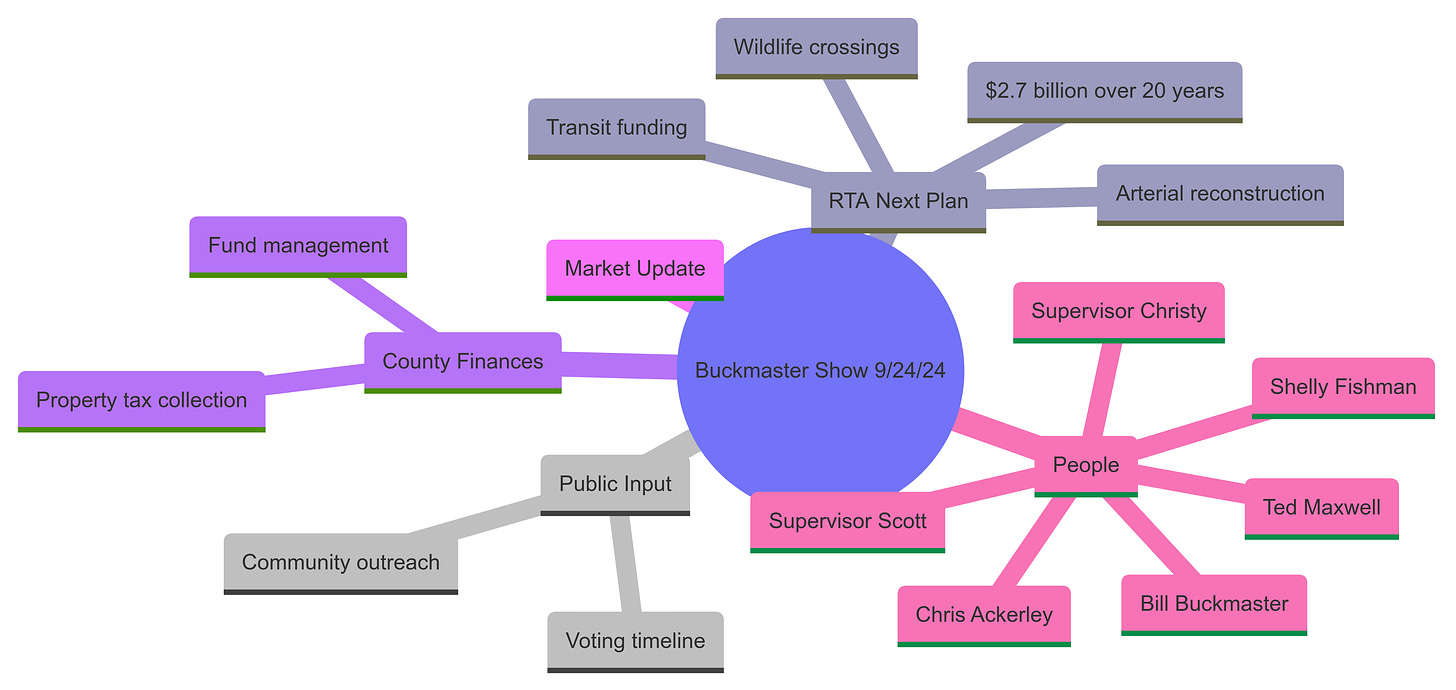🚗💰 RTA Next: Tucson's $2.7 Billion Gamble on Transportation
🦌vs🛣️ Wildlife Crossings Take a Back Seat in New RTA Plan 🚌⚠️ Transit on the Brink: RTA Renewal or Service Cuts? 💸📊 Follow the Money: Inside Pima County's Treasury
Based on the 9/24/24 Buckmaster Show episode on KVOI-1030AM.
🙊 Notable quotes from the show
"It's a significant amount of money. And I think we're at a point now where we've got, there's even pieces in this plan that I don't love, I maybe don't even like much, but there's more positive in it than there is negative to me." - Ted Maxwell on the RTA Next plan
"If this fails, a significant amount of money annually will no longer be going to support the current transit system. Which means there's gonna have to be reductions." - Ted Maxwell on the consequences of not renewing RTA
"There's a lot of environmental advocates that are upset with us because we moved, that used to be 50 below the pessimistic line. And we moved that at the last minute to put 25 above and 25 below." - Ted Maxwell on changes to wildlife crossing funding
"If you want input from the community, you have to go to the community." - Ted Maxwell on public engagement
"So far as an investor, it's wunderbar." - Shelly Fishman on current market conditions
⏮️ ICYMI: From the Last Show…
😽 Keepin’ It Simple Summary for Younger Readers
👧🏾✊🏾👦🏾
🚗🚌🦌 Grown-ups in Tucson are talking about spending lots of money to fix roads and keep buses running. 💰They want to spend $2.7 billion over 20 years! 🛣️ This money would fix big streets in Tucson and help build new roads where the city is growing. 🐾 Some people are worried there's not enough money to help animals cross roads safely. 🗳️ Before deciding, they want to ask everyone what they think. It's a big decision that will change how people get around Tucson for a long time! 🏙️🌵
🗝️ Takeaways
🚗 RTA Next proposes $2.7 billion in transportation spending over 20 years
🏙️ Plan focuses on arterial road reconstruction, especially in Tucson
🦌 Environmental funding for wildlife crossings reduced, sparking controversy
🚌 About 20% of RTA funds support current transit operations
🗳️ Public input crucial before finalizing plan for 2024 or 2025 vote
💰 RTA provides double the transportation funding of state and federal sources combined
📻 What They Discussed
On Tuesday, September 24, 2024, the Buckmaster Show, hosted by Bill Buckmaster, featured two prominent guests discussing critical issues facing Pima County.
Ted Maxwell, President and CEO of the Southern Arizona Leadership Council and Regional Transportation Authority (RTA) Board member provided extensive insights into the proposed RTA Next plan.
The show also included segments with Chris Ackerley, the recently appointed Pima County Treasurer, who shared information about property tax collection and county finances.
Additionally, financial advisor Shelly Fishman offered a brief market update.
🚗 Driving Toward 2026: The RTA Next Plan Unveiled
The Regional Transportation Authority (RTA) Next plan emerged as the central topic of discussion, with Ted Maxwell providing a comprehensive overview of this $2.7 billion, 20-year proposal aimed at shaping Tucson and Pima County's transportation future. Maxwell emphasized the plan's significance, noting that it would provide about $120 million annually for transportation projects - roughly double the funding received from federal and state sources combined.
The plan aims to strike a delicate balance between the needs of various municipalities and unincorporated areas within Pima County. Major focuses include improvements to arterial roads and critical traffic interchanges, particularly in growing areas like Marana. Maxwell highlighted the plan's attempt to address regional equity, stating, "Marana fairs pretty well if you look at the total number," while also emphasizing the importance of projects within Tucson city limits.
A key addition to the plan is the concept of "arterial reconstruction," particularly within Tucson. Maxwell explained that this involves "actually reconstructing the road curb to curb," with no design required, making these "easy, simple, straightforward projects to do." He noted that the City of Tucson has already identified about $250 million worth of arterials in need of such reconstruction.
The plan also includes provisions for public transit, with Maxwell revealing that about 20% of RTA funds support current transit operations. He warned of potential significant cuts to transit services if the RTA is not renewed, underscoring the plan's critical role in maintaining and potentially expanding public transportation options.
🦌 Wildlife vs. Asphalt: The Environmental Debate
One of the more contentious aspects of the RTA Next plan involves funding for environmental projects, particularly wildlife crossings.
Maxwell acknowledged that "There's a lot of environmental advocates that are upset with us" due to changes in the allocation of funds for these projects.
The plan now includes $25 million for wildlife crossings in the main budget, with an additional $25 million possible if revenues exceed projections. This represents a shift from previous proposals, which had allocated more guaranteed funding for these environmental initiatives.
🗳️ The Path to Approval: Public Input and Voting Timeline
Maxwell emphasized the crucial role of public input in finalizing the RTA Next plan.
He stressed the need for comprehensive community outreach, stating, "If you want input from the community, you have to go to the community."
The timeline for putting the plan before voters remains flexible, with potential dates in May or November 2024, and a final possibility in May 2026. Maxwell noted the urgency created by election cycles and the plan's 2026 sunset date, saying, "We've got until June of 2026, but we're on election cycles." This timeline is particularly critical given the comparison to Maricopa County, which is currently facing its own transportation funding vote with a looming deadline.
💰 County Coffers: Insights from the Treasurer's Office
In a separate segment, newly appointed Pima County Treasurer Chris Ackerley provided insights into the county's financial operations. Ackerley, drawing on his background as a former high school teacher and state representative, explained the treasurer's role in collecting property taxes and managing county funds.
Ackerley emphasized the importance of timely property tax payments and encouraged homeowners to be proactive in obtaining their tax statements, especially if they've recently purchased a property.
He advised, "If you bought your home and you did, but, you know, from July on, well, basically, if you own a home that's not covered by a mortgage company and you haven't gotten a tax statement, contact our office."
📈 Market Musings: A Brief Economic Update
Financial advisor Shelly Fishman offered a quick market update, noting positive trends for investors. His succinct comment, "So far as an investor, it's wunderbar," suggested a generally optimistic outlook on current market conditions, though the brevity of his segment limited in-depth analysis.
Through these diverse topics, the Buckmaster Show provided listeners with a comprehensive look at the intersecting issues of transportation planning, environmental conservation, public finance, and economic trends shaping Pima County's future. The discussions highlighted the complex challenges facing local leaders as they attempt to balance diverse needs and interests in crafting policies for the region's development.
🦉 Three Sonorans Commentary
🌵 Paved Paradise: The Hidden Costs of Tucson's Transportation Dreams
As Tucson stands at a crossroads with the proposed RTA Next plan, we must critically examine the $2.7 billion proposal through the lens of social justice, environmental protection, and true community needs. While informative, the recent discussion with Ted Maxwell glossed over crucial issues that demand our attention.
First and foremost, the reduction in guaranteed funding for wildlife crossings is a glaring red flag. Maxwell casually mentioned:
"There's a lot of environmental advocates that are upset with us because we moved, that used to be 50 below the pessimistic line. And we moved that at the last minute to put 25 above and 25 below."
This isn't just about upset advocates; it's about the very survival of our unique Sonoran Desert ecosystem. By prioritizing road expansion over wildlife protection, we're continuing a legacy of environmental destruction that has already pushed countless species to the brink. We must demand that environmental concerns be at the forefront of any transportation plan, not an afterthought.
Moreover, the plan's focus on "arterial reconstruction" raises serious questions about equity and sustainable urban planning. Maxwell boasted:
"It's actually reconstructing the road curb to curb. So, no design is required. So they're easy, simple, straightforward projects to do."
But should our goal be "easy" and "straightforward," or should we reimagine our urban spaces to prioritize pedestrians, cyclists, and public transit users? This car-centric approach perpetuates systems of inequality, disproportionately benefiting those who can afford personal vehicles while neglecting the needs of low-income communities and communities of color, who often rely more heavily on public transportation.
Speaking of public transit, Maxwell's warning about potential service cuts is a classic fear tactic:
"If this fails, a significant amount of money annually will no longer be going to support the current transit system. Which means there's gonna have to be reductions."
Instead of using transit funding as a bargaining chip, we should demand a plan that prioritizes and expands public transportation options. This would serve our most vulnerable populations and contribute to reducing our carbon footprint—a critical concern in this era of climate crisis.
The rushed timeline for public input is also deeply concerning. Maxwell stated:
"We've got until June of 2026, but we're on election cycles."
This urgency could lead to a rubber-stamping of the plan without thorough community engagement, particularly from marginalized voices often left out of these discussions. We must demand a genuinely inclusive process that prioritizes the needs of all community members, not just those with the loudest voices or deepest pockets.
As we move forward with discussions about RTA Next, we must demand a plan that:
Prioritizes environmental protection and wildlife conservation
Focuses on equitable public transit expansion rather than car-centric infrastructure
Incorporates genuine community input, especially from marginalized communities
Addresses the root causes of transportation inequality, not just its symptoms
Considers the long-term impacts of climate change on our region's transportation needs
The future of Tucson's transportation isn't just about roads and buses - it's about the kind of community we want to build. Will we continue down the path of urban sprawl and environmental degradation, or will we seize this opportunity to create a more just, sustainable, and inclusive Tucson for all? The choice is ours, but only if we make our voices heard.
If you enjoyed this article, buy us a cup of coffee! Seriously — we 🤎☕!
👯 People Mentioned
Ted Maxwell - Southern Arizona Leadership Council President and CEO, RTA Board member
Quote: "I feel extremely, extremely strong about the fact that we have to have regional funding and a regional approach if we really want to have our infrastructure."
Bill Buckmaster - Host of the Buckmaster Show
Chris Ackerley - Pima County Treasurer
Quote: "If you bought your home and you did, but, you know, from July on, well, basically, if you own a home that's not covered by a mortgage company and you haven't gotten a tax statement, contact our office."
Supervisor Christy - Pima County Supervisor (mentioned, no direct quotes)
Supervisor Scott - Pima County Supervisor (mentioned, no direct quotes)
Shelly Fishman - Financial advisor Quote: "So far as an investor, it's wunderbar."








